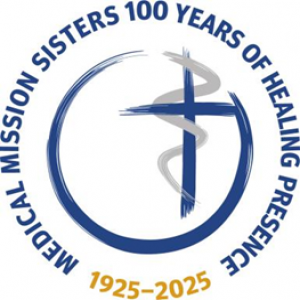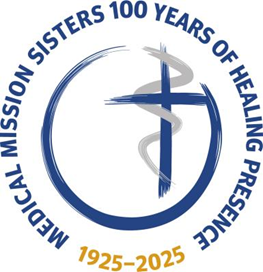

The Society of Catholic Medical Missionaries, commonly known as the Medical Mission Sisters (MMS), was founded on September 30, 1925, in Washington, DC, to promote health and healing in underserved communities. It will complete its 100th year in 2025. The Congregation began as a pious Society committed to addressing the healthcare needs of women, when canon laws were not in favour of religious individuals entering the medical field, primarily to assist women in childbirth and surgery.
MMS, founded by Dr. Anna Dengel (Austria) in collaboration with another doctor and two nurses from the USA, expanded in size and demonstrated through their lives and mission that religious life and medical work can coexist. Dr. Dengel made continuous efforts to effect changes in Canon Law through her contacts in Rome. Later on, in 1936, Canon Law was changed, permitting religious to engage in medical work in its full scope. The Medical Mission Sisters finally became a religious congregation.
MMS was totally committed to the healthcare needs of people in the continents of Africa, Asia and Latin America, establishing hospitals and training healthcare professionals from 1925 to 1967. Responding to the challenging invitation of the Second Vatican Council, MMS conducted a critical analysis of its institutions in various countries.
We realised that for the holistic health and well-being of a person, attending to physical health alone is insufficient; social, mental, emotional, and spiritual dimensions also need to be addressed, which becomes part of the healing Charism. It was observed that as the institutions developed, poor and ordinary people were unable to access the hospital's services. These were taken into serious consideration.
Medical Mission Sisters were very convinced that their commitment is to the less privileged people. The General Chapters of the Congregation affirmed it, and sisters were invited to enter into other areas of healing ministry and to prepare themselves for new areas of mission. This preparation began from the formation stage for new members. Believing that prevention is better than cure, hospitals expanded their services through community health programs and prioritised preventive measures through awareness and education.
After the mid-1970s, sisters began to move out of hospitals to more impoverished areas. In India, sisters started their mission in the villages of Madhya Pradesh, Chhattisgarh, Bihar, Maharashtra, Tamil Nadu, Kerala, and the northeastern states of Meghalaya, Nagaland and Assam. The mission among the fisherfolk in Kerala was of great significance. The sisters took a stand for them, organised protest marches, and engaged in indefinite fasting for their rights, which ultimately yielded results after many years of struggle.
Sisters lived in community with people close to them, in simple settings, with limited living facilities, and were affected by the life realities of those around them. There was much to learn. The convents turned into open houses where people could easily approach for their needs. Sisters were daring and generous enough to respond to the different health needs of the people, day or night, irrespective of the inconveniences of travelling to faraway places, especially in adverse climatic conditions.
The words of Anna Dengel, "read the signs of the time and respond," always gave confidence and assurance to take new paths. Since 1980 onwards, new initiatives were taken in alternative modes of treatment, drugless therapies, de-addiction treatment and rehabilitation, working with HIV/AIDs and cancer-affected people. Collaboration and networking with other groups/the government, focusing on ecology and the environment, as well as awareness programs on lifestyle diseases, pastoral and palliative care, empowerment programs, and the formation of Associates, were other areas of intervention.
In the 1980s and 1990s, many hospitals were handed over to other congregations or dioceses. In India, Holy Family Hospital, Delhi, was handed over to the Archdiocese of Delhi, Holy Family Hospital, Bombay, to the Ursuline Sisters, St. Thomas Hospital, Chethipuzha, to the Changanacherry Archdiocese, Medical Trust Hospital, Mundakayam, to the Diocese of Kanjirappally and Holy Family Hospital, Koderma, Jharkhand (then Bihar), to the Franciscan Clarist Congregation. Holy Family Hospital, Patna, has been functioning in partnership with the Sisters of Charity of Nazareth (SCN) for the past 25 years. Holy Family Hospital, Ranchi, has been donated to the CBCI for the purpose of establishing a Catholic Medical College in northern India.
Immaculate Heart of Mary Hospital at Bharananganam (commonly known as Mary Giri) has continued to provide basic, quality services affordably for the last 76 years. The holistic health centres in Pune and Changanacherry (Ayushya) offer drugless therapies, counselling, and train people in alternative modes of treatment. The empowerment programs conducted in collaboration with the government in the North East, especially in Meghalaya, have helped many improve their socio-economic status and lead healthier lives. The involvement and intervention of sisters through de-addiction centres in Mandar (Jharkhand), Dimapur (Assam), and Kottayam (Kerala) provide great consolation and support to families.
The sisters are vigilant and constantly search for new avenues to respond to as the signs of the times unfold. The words of Mother Anna Dengel, "The future is yours… You are conscious of the needs of the day, as I was of my days", always encourage us to venture into the new.
Looking back at the 100 years of Medical Mission Sisters, there was a pioneering spirit to begin health care facilities for the less privileged, openness to look at themselves critically to make their presence relevant according to the needs of the time, constant search, willingness to let go, confusion, uncertainty and a lot of challenges. We see the guiding and strengthening hand of the Lord in all the daring steps taken and are deeply grateful to God and to all those who walked with us as coworkers, collaborators, friends and benefactors in our hundred years of journey.